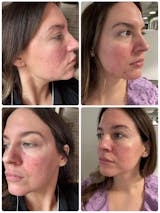
Have you ever been told to cut out chocolate or stop eating your favorite snacks because they ‘make acne worse’? The internet is full of articles on anti-acne diets that claim to improve your skin but are they anything more than myths?
For decades, the relationship between diet and acne has been debated. Even today, there is no consensus that changing your diet is a good way to manage acne.
That said, there is evidence that certain foods may play a role in acne and its treatment1.
What Does the Science Say?
In a recent systematic review, researchers looked at 11 interventional clinical trials and 42 observational studies published from 2009 to 2020. The results showed that high-glycemic foods, certain dairy products, fast food, and chocolate can promote acne whereas fruits, vegetables, and fatty acids can protect against acne2.
Another study of 24,452 participants also found a correlation between the chances of having current acne and the consumption of milk, and fatty and sugary products. Compared with those who have never had acne, those with current acne were 54% more likely to consume a diet with lots of high-fat and high-sugar foods3.
Let’s take a closer look at the research on what could be the two biggest acne-causing culprits in our diet: high-glycemic foods and cow’s milk.
High-Glycemic Foods
From white bread and white rice to potato chips and sugary drinks, high-glycemic foods cause your blood sugar to rise quickly. As you can imagine, these are common foods many of us enjoy consuming. We mean, milkshakes are yum!
Thing is, studies suggest a low-glycemic diet may reduce how much acne we have4. Low-glycemic foods include your fresh vegetables, some fruits, and beans. For example, a US study of 2,258 patients who were placed on a low-glycemic diet to lose weight found that the diet also reduced their acne. 87% of patients said they had less acne and 91% said they needed less acne medication5.
It is possible that a low-glycemic diet may reduce acne because it stops blood sugar spikes. These spikes can cause inflammation and increased sebum production, both of which can lead to acne4.
Cow’s Milk
Some studies suggest that drinking cow's milk may be linked to more (and more severe) acne4. In a Malaysian study, 88 patients were asked to complete a food diary for three days. It found that the patients who had acne consumed more cow's milk and high-glycemic foods than the patients without acne6. A possible explanation for this is that some of the hormones in milk cause inflammation throughout the body, clogging pores and leading to acne4.
Similarly, a 2019 study noted a positive relationship between acne occurrence and milk consumption, including whole, low-fat, and skim milk. However, it found no significant association between getting acne and consuming yogurt and cheese7. This suggests that while milk may increase the risk of getting acne, products made from milk may not.
So, What Should I Eat?
While more research is needed to confirm whether certain foods can cause or worsen acne, if you would like to see if your skin can benefit from diet changes, you can consider trying this out for a week:
Eat more low-glycemic foods such as whole grains, vegetables, berries, nuts, seeds, and fruits with skin (e.g. pears and apples)
Limit cow’s milk and high-glycemic foods such as sugar, pastries, soft drinks, white bread, white potatoes, and white rice
At the end of the week, notice if there are changes to your acne.
But remember, the key with diet is moderation. As consultant dermatologist Dr Anjali Mahto puts it, “Labelling food as the problem is too simplistic and fails to take account of the multi-factorial nature of acne, which includes variations in hormones and genetics.”8
As such, while good nutrition is important for your skin8 (and overall health), never be afraid to enjoy your favorite foods every once in a while.
Fighting Acne Needs More Than a Diet Change
While diet changes may help improve your acne, getting and keeping clear skin takes more than that. It includes leading a healthier lifestyle all around, from managing stress and sleeping well to using acne-friendly skincare.
Clearly Basics is a skincare line made for acne-prone and sensitive skin. This means all our formulations are gentle enough to care for vulnerable skin yet effective enough to clear clogged pores and prevent future breakouts. Shop the line here.
Have acne questions?
We’re here to help! Get in touch with us via Messenger chat or Instagram DM (@clearlybasics).
References
- Hilary Baldwin et al., 2020: Effects of Diet on Acne and Its Response to Treatment
- Federica Dall’Oglio MD, PhD et al., 2021: Diet and acne: review of the evidence from 2009 to 2020
- Laetitia Penso et al., 2020: Association Between Adult Acne and Dietary Behaviors: Findings From the NutriNet-Santé Prospective Cohort Study
- American Academy of Dermatology: Can the right diet get rid of acne?
- Panta Rouhani et al., 2009: Acne improves with a popular, low glycemic diet from South Beach
- Noor Hasnani Ismail et al., 2012: High glycemic load diet, milk and ice cream consumption are related to acne vulgaris in Malaysian young adults: a case control study
- Mohadeseh Aghasi et al., 2019: Dairy intake and acne development: A meta-analysis of observational studies
- Dr Anjali Mahto 2018: The Dangerous Link Between Skin Conditions & Eating Disorders
Disclaimer: This article should not be interpreted as personal medical advice. For medical-related matters, please consult your dermatologist.






